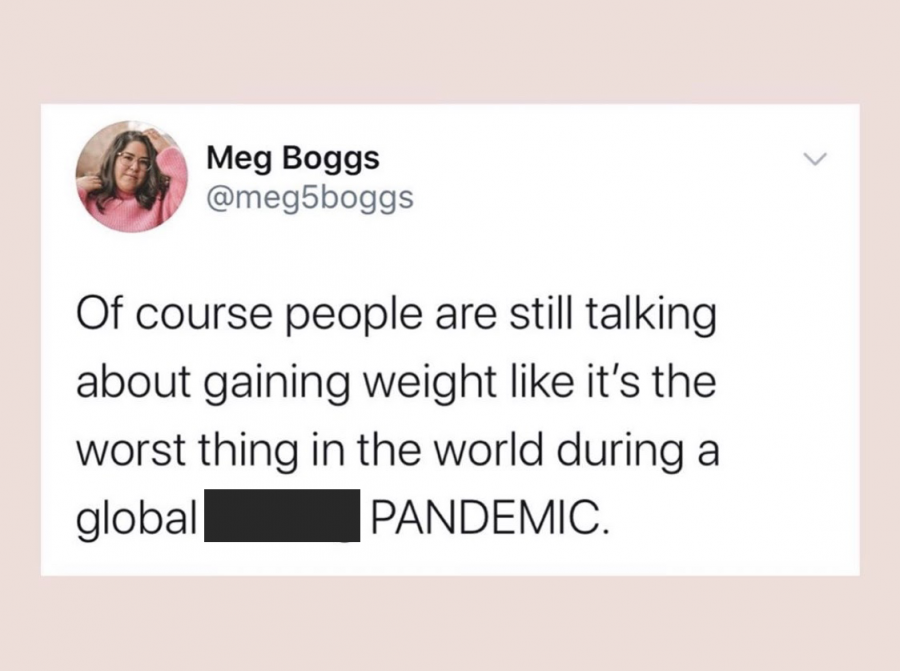Social distancing, instrumental in containing viral spread, can also unfortunately lead to social isolation. And though distancing slows infection rates, the absence of routines and ‘normal life’ while staying home also has adverse effects on mental health.
In these past months of quarantine and isolation, many have expressed concern for sedentary lifestyles or dedicated themselves to new diets, workouts, and self-improvement journeys. And while lifestyle changes are not inherently negative, the toxic culture surrounding wellness, especially as it is marketed to teenagers and young adults, can have more harmful than helpful health effects.
“The Quarantine 15,” a play on the idea of the “Freshman 15,” has circulated in the media throughout the pandemic. The phrase suggests that because of decreased movement and a lack of a structured routine from stay at-home orders, a person may see unprecedented weight gain, much like a college freshman who often struggles to adapt to new habits, environments and eating patterns.
Many of these ideas find a breeding ground on social media. They have rapidly proliferated during the pandemic, a time in which we are more reliant than ever on these platforms and more emotionally vulnerable.
There are many problems with this trendy phrase, one being its close ties to diet culture.
Diet culture – a belief system that prioritizes a certain body type, weight, size or lifestyle over well-being – often also promotes or leads to rigid eating patterns or drastic, ultimately unsustainable, life changes in the pursuit of an aesthetic or false idea of “health.”
Diet culture is deeply ingrained in our society and can be hard to avoid. The idea of working out with the sole goal of losing fat or weight, the generalization of ‘athletic’ as a body type, and even many seemingly ‘healthful’ eating regimens, are ultimately rooted in diet culture.
This eternal struggle toward a specific vision of ‘health’ neglects not only the intrinsic genetic and social influences on body shape, but also the environmental circumstances in which many ‘fitspos’ are encouraging these ideas. Especially at a time in which teens are emotionally
vulnerable and facing extreme worldwide events, feeling guilt to lose weight or maintain a specific figure is counterproductive and can encourage disordered eating or behaviors.
“It really affects students’ self-esteem when we really need to think, you know, we’ve really had a huge disruption to our normal lives and routines so of course our bodies are going to look a little different,” health teacher Lori Emery said.
The prevalence of these ideas on social media results in a young target demographic. With an excess of conflicting messaging, it can cause confusion and adverse effects for teenagers and young adults.
“[As teenagers] We’re still growing and in a vulnerable spot that makes us easily swayed by external factors,” senior Joyce Zhang said.
Fitness programs and new lifestyle changes, which many have turned to during the pandemic, can have genuinely positive effects. The advantages of movement are significant, but when these supposed healthy lifestyles come at the cost of mental well-being, such activity can actually negate health benefits. When these trends become something that one does out of obligation, or only to lose weight and fit a certain aesthetic, it can become unhealthy and obsessive.
Body dysmorphia affects all genders, although statistics show that 60% of high school females report actively trying to lose weight. With data this dire, it is clear that there is a problem with how we value numbers on the scale. Especially for teenagers whose bodies are changing and need more calories to sustain growth than any other age group, the flood of weight loss slogans and ‘slimming teas’ can be hugely influential and harmful.
Instead of focusing on losing weight or beating ourselves up about what we are consuming, as a society, we need to be mindful of our health and well-being, especially during this time.
Although many social media fitness/diet accounts associate weight loss with health, weight and body shape are ultimately outdated means of measuring athletic ability and health.
The Health At Every Size framework promotes respect for a diverse range of shapes and sizes and balanced eating, enriching physical activity, and is continually being adopted by dieticians and physicians.
Not only does the focus on fluctuations in body weight emphasize inconsequential standards in a time of global strife, but it creates an unhealthy mindset that can develop into maladaptive behaviors and disordered eating.
“We shouldn’t be ashamed, either way, whether you lose or gain weight or stay the same,” Emery said. “This [pandemic] is a huge disruption to our lives, so we need to stop focusing on ‘has your body taken effect to COVID- 19’ versus so many other things going on: unemployment, virtual learning from home, businesses losing money, and things like that.”
“Instead of channeling your energy focusing on maintaining or losing weight, direct it towards fighting your internal self-degrading comments,” senior Grace Wilson said.
Especially for teenagers and young adults, the need to counteract negative messaging is more important than ever. As TikTok has become a part of many teenagers’ daily routines during stay-at-home orders, fitness and diet trends have emerged and circulated on the platform.
One viral TikTok format is the “what I eat in a day,” video, which typically features a summary of the TikToker’s food. However, many of these “meals” consist of far fewer calories than the body needs, meaning that these videos promote and normalize unhealthy weight loss and eating patterns. Weight loss at this rate can even lead to nutritional deficiencies, slowed metabolism and other long-term problems.
”[Quarantine 15] puts this notion in young students’ minds that it’s not ok for your body to change and that if you gain any weight, you should think less of yourself,” Emery said.
Recently, there has been a positive response to the body-shaming trend, with many TikTokers opting to create videos proudly showing off their bodies without shame.
Bodies may change as a result of a temporary change in routine or habits. In light of recent events happening worldwide, we must focus on the issues at stake and try to focus less on our physical appearance while redefining our notions of health, both physical and mental.
The Mercer Island Youth and Family Services team/the R&R counselors at MIHS are continuing to operate through a private telehealth model. If you are concerned about yourself or someone else, you are more than welcome to email [email protected]
What to focus on instead and how to change your mindset:
-What activities (athletic or not) do I enjoy doing that make me happy?
-Self care: painting nails, reading a book, journaling, hanging out with friends or family (socially distant of course!), playing with your pet, going to the park, work on creating more positive self talk








